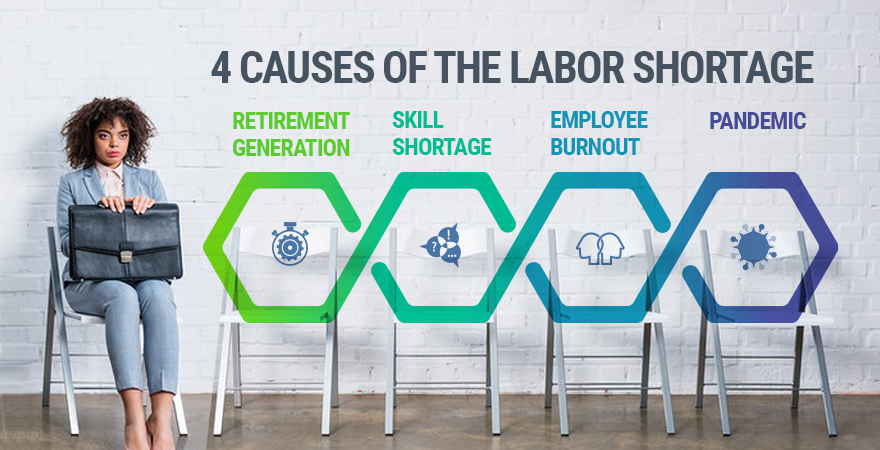Employers can’t find workers amidst the Great Resignation while the existing workforce is slowly shrinking due to a current labor shortage. It’s several months in the making that people are voluntarily quitting their jobs; even with over 10 million positions open, recruiters can do little to fill them. One may wonder, why is this labor crisis happening? And even with so many open posts, why can’t companies hire?
Some of the reasons frequently mentioned by economists as to what caused the labor shortage include health and safety concerns, requiring at-home care, demands in benefits and flexibility, career switching, reimagining life, and holding out for higher wages. Below we have discussed four of the many reasons for the labor shortage 2021
Reasons for the Labor Crisis

Loss of the Retirement Generation
Pre-pandemic levels of the labor force participation rate were much higher than today, with a major chunk of the workforce now retired. Whether forced into early retirement by being furloughed or laid off or doing so willingly; Covid-19 has greatly impacted the participation and recovery of older workers. As the Boomer generation is less likely to return to work due to health risks, there is a sudden gap in the labor force that has surged post-pandemic.
The number of retired workers increased from 45.1 million to 69.8 million, in 2021 from 2019 – Annuity.org
The Skill Shortage and Mismatch of Jobs
With the older generation not returning, the younger ones do not have the necessary experience employers are looking for in the changing job market today. Those organizations that are recruiting are facing challenges in acquiring the right fit, claiming a lack of skills and a 15-year high talent shortage among mismatched applicants. If employers can’t find what they are looking for, the open positions are likely to go unfilled, creating a further gap.
Requiring years of experience for a particular post, employers want in-person on-site workers that they don’t have to train. Whereas the working generation (mostly millennials) demand remote hours and flexible environments, so they don’t have to return full-time. The younger generation is willing to continue looking for work remotely until they find something fulfilling or a job that caters to their mental and monetary well-being.
Burnout is on the Rise
The push towards the 9-5 grind by employers is also causing massive burnout to the existing employees. Taking on extra duties to keep systems running while trying to find a balance between home and work; employees are discontented and overworked. The current ones are already on the lookout to switch or quit their existing positions, just to let go of the stress, and search for better opportunities. If not addressed, this would lead to a greater labor shortage in the future.
Pandemic Choices
Employees wanting to change their work situations from before are asking for higher wages in addition to benefits. Particularly driven by panic buying during the pandemic, the increased demand for goods and services has led laborers to imagine a better lifestyle. Stimulus aid may have changed the worker mindset permanently in the pandemic months. It is now that people have realized they were never happy with the existing work conditions (going on decades) and want to continue no further.
Some other connected reasons include wanting better payouts, discrimination at the workplace, desiring to be your own boss, shuffling careers, and childcare duties among others. Regardless of how many reasons there may be, they all work in the amalgam to create this current labor crisis which is likely to continue if the word “work” itself is not redefined.
How to Overcome the Labor Shortage?
Even with perks and benefits, increased salaries, better healthcare, WFH options, etc. what will companies do when they can’t find the right talent to hire? More so for the fundamental roles that require a full-time presence when people aren’t willing to work; immediate employment is required. Amidst a talent shortage on the rise, you will not find suitable candidates from the same pool of applicants. The solution is to co-source with a firm willing to take on your cultural values as their own.
Co-sourcing partners have offshore resources that offer low-cost, high-quality services, parallel to standards of in-house employees. Especially during a labor crisis, when talent is scarce, an outsourcer like Premier can fill your empty roles in a matter of weeks. With us, you won’t feel the effects of the labor crisis, turnover won’t be a problem anymore, and we staff people for highly specialized roles and custom skillsets. To know more, visit us here.
 Skip to content
Skip to content





